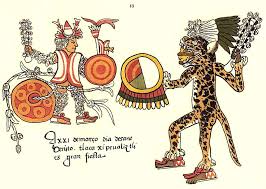Your basket is currently empty!
The Aztec Empire, one of the most dominant civilizations in pre-Columbian Mesoamerica, had a remarkably different reason for going to war. Unlike most empires that sought to expand their territory, the Aztecs waged war primarily to capture prisoners for human sacrifice. For the Aztecs, war was a spiritual duty, not just a political or economic necessity.
Religion at the Heart of Aztec Warfare
At the core of Aztec belief was the idea that the gods—especially Huitzilopochtli, the sun and war deity—required constant nourishment through human blood. Without these offerings, the sun would cease to rise, and the world would fall into chaos. This belief turned warfare into a religious obligation. Capturing live enemies to be sacrificed was considered the highest achievement of an Aztec warrior.
The Flower Wars: Ritual Battles for Sacrifice
This religious motivation led to the creation of the “Flower Wars” (xochiyaoyotl), a series of pre-arranged battles between the Aztecs and neighboring city-states. These wars were not about conquest, but about gathering live captives for ritual ceremonies.
-
Warriors were trained from a young age to disable, not kill their enemies.
-
A warrior’s status and military rank depended on how many captives he brought back.
-
The prisoners were often sacrificed during grand ceremonies atop the Templo Mayor in the capital city of Tenochtitlan.
Dual Purpose: Tribute and Religion
While the Aztecs did occasionally conduct wars for political control and economic tribute, their religious need for captives remained central. Many neighboring city-states paid tribute in goods—but were still forced into flower wars to supply sacrificial victims.
This unique dual purpose of warfare—religious and political—influenced every aspect of Aztec society, from military training to social mobility.
A System Exploited by the Spanish
The Aztec emphasis on capturing rather than killing created weaknesses that Spanish conquistadors quickly noticed. Hernán Cortés and his allies exploited local resentment toward Aztec demands for tribute and human sacrifices. By forming alliances with enemy city-states like Tlaxcala, the Spanish were able to turn Aztec tactics against them.
Warfare as a Sacred Act
For the Aztecs, the battlefield was more than a place of violence—it was a sacred space where cosmic balance was maintained. Human sacrifice was not seen as cruelty, but as a necessary act to preserve life on Earth. This deeply spiritual view of war made the Aztec Empire one of the most unique and complex civilizations in world history.
Final Thoughts
Modern historians continue to debate how much strategy was shaped by religion versus politics. But one thing is clear: Aztec warfare was unlike anything in the Western world. It was not about land, wealth, or conquest—it was about divine duty, cosmic balance, and the power of blood.

